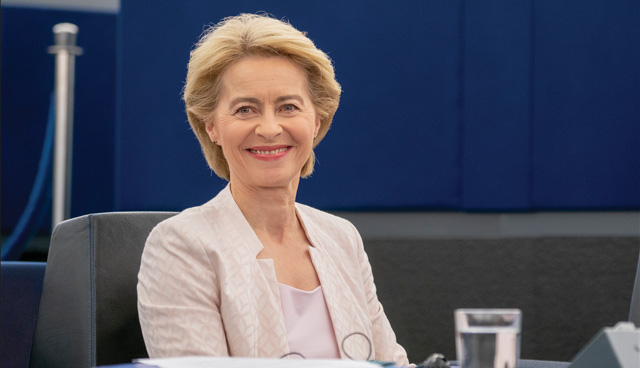Von der Leyen: Protocol is the only solution

On a recent visit to Ireland, European Commission President Ursula von der Leyen said the Protocol on Ireland/Northern Ireland was the only solution the EU had arrived at in years of negotiation with the UK.
The Protocol is the only way to manage the competing needs of the UK and the EU, von der Leyen told a press conference in July, calling it “the only solution we have found with the UK after discussing that over years”. “It’s the only solution to protect peace and stability on the island of Ireland and to protect the integrity of the single market,” the Commissioner stated.
The Commissioner’s comments were, at the time of her July visit to Ireland, the latest in the back and forth between the British Government and the EU on the topic of the Protocol. What followed in the weeks after was more back and forth, where von der Leyen again stated that the EU would not renegotiate the Protocol.
“The EU will continue to be creative and flexible within the protocol framework,” she said. “But we will not renegotiate.” In response, a British Government source said: “The Prime Minister [Boris Johnson] set out that the way the Protocol was currently operating was unsustainable. Solutions could not be found through the existing mechanisms of the protocol. That was why we had set out proposals for significant changes to it.
“He urged the EU to look at those proposals seriously and work with the UK on them. There is a huge opportunity to find reasonable, practical solutions to the difficulties facing people and businesses in Northern Ireland, and thereby to put the relationship between the UK and the EU on a better footing. They agreed to remain in touch.”
Von der Leyen’s visit to Ireland was intended to signal that while Brexit and its ramifications remain important, Ireland and the EU are beginning to move on and focus on what lies ahead. Her visit to Dublin was to announce European Commission approval for Ireland’s application to the Recovery and Resilience Fund, a package of investment and reforms designed to help member states recover from the economic damage wrought by Covid-19. The approved funding will see the EU contribute €989 million of its €750 billion NextGenerationEU fund to Irish projects.
The funding is expected to raise Irish GDP by between 0.3 per cent and 0.5 per cent by 2026. The fund, much of which was raised through EU common debt issuance for the first time, was compared by von der Leyen to the Marshall Plan, the $13 billion of funding (roughly $114 billion by today’s rates) delivered to Europe by the US in 1948 that helped the continent rebuild in the aftermath of World War II.
42 per cent of the funding delivered to Ireland will be steered towards climate-related projects, including €164 million for electrification of the commuter rail network in Cork and €108 million for the rehabilitation of peatlands. Digital projects will account for one-third of the funding, which will include projects such as the digitalisation of public administration and services, development of a shared government data centre, and the reform of schools’ IT infrastructure. Social and educational projects such as housing and technological education are to be included within the projects funded by the money.
“42 per cent of the funding delivered to Ireland will be steered towards climate-related projects, including €164 million for electrification of the commuter rail network in Cork and €108 million for the rehabilitation of peatlands.”
Ireland’s wish list for the funding was submitted in May and was said to have meshed well with European Commission priorities, most notably the green agenda that is covered under the European Green Deal. As such, approval of the funding was said to have been largely unproblematic, with Ireland joining 12 other member states who had been approved for funding at that stage. Hungary, however, has seen the approval of its application delayed over it defiance of rule-of-law obligations, currently subject to multiple court cases, with concerns specifically about its anti-corruption measures.
During her visit, the Commission President also stated her belief that the Irish Government had been “exemplary” in its handling of the Covid-19 pandemic. “Ireland is exemplary in how it has approached this pandemic,” she stated. She added that Ireland had been excellent “where delivery of vaccines is concerned, and the response of this country”.
“I can only commend you,” she said at the press conference, addressing Taoiseach Micheál Martin. “I have looked at the numbers and developments over the last six months before coming here and Ireland is exemplary in the way it has approached this pandemic with all the difficulties we faced and overcome together.”
Asked if the advice from Ireland’s public health experts that people should not travel abroad unless vaccinated undermined the European approach to the Digital Covid Green Certificate, von der Leyen said that she welcomed the Irish Government’s decision to join the Covid Cert system. “I just today had the opportunity to test it, it works fine,” she said.
“All our member states, and Ireland too, have always the possibility and responsibility to look at the regional epidemiological situation and adapt,” von der Leyen said, having been asked for her view on Ireland’s slower reopening of indoor dining and its hesitance towards the widespread use of antigen testing. While a common set of approaches exists, member states have a responsibility to look at the regional situation and “adapt” if they feel it is needed given the prevalence of the Delta variant, the Commission President said.





